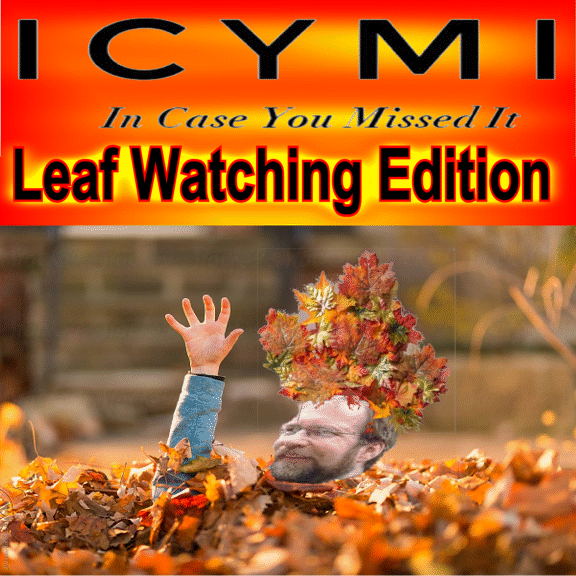Leaf Watching Edition (10/18)
There's a Better Way: Trust Based Observation
Craig Randall guests at Peter DeWitt's EdWeek blog spot talking about a better way to handle teacher evaluations and, really, school management in general.
Separate and Unequal: School Funding in PA
In the Pocono Record, an op-ed looking at the eternally unsolved issue of school funding in PA, by a student in Harrisburg.
School Boards, Public Schools, and Home Rule
Accountabaloney lays out the many ways that the Florida legislature has tried to strip school boards of their power. Because Florida is just the worst.
Fix America by Undoing Decades of Privatization
At the Atlantic, K. Sabeel Rahman puts the attack on public education in the larger context of privatization in the US.
Students Use Tik Tok to document test-taking surveillance software
At Jezebel, a look at the software surveillance programs that are turning test taking into an unholy nightmare, and how students are fighting back.
Ohio: Who Pays for Vouchers
Over at Diane Ravitch's blog, a look at a study showing how the costs of vouchering in Ohio are really getting covered.
Covid Learning Loss Overhyped
Thomas Ultican has a good overview of the many folks who are trying to chicken little the heck out of the "covid slide." Guess what-- they'd all like to sell you something.
Governor Lee Calls For Suspension of Testing
Go figure. Bill Lee of all people is standing up against the Big Standardized Test. The Tennessean has the story.
Boston students shivering in the cold
An early look at one of the next pandemic school crises--schools that have decided to solve ventilation problems by opening windows in places where winter is a thing.
Charter Schools hitting same roadblocks as public schools
At Chalkbeat, Kalyn Belsha and Mat Barnum counter the standard narrative on resistance to school openings ("it's those damned unions") by showing that charter schools are having similar problems.
Don't Believe the Hype
Akil Bello explains why you can ignore the bleating of the test industry and their insistence that they provide students with opportunities.
Who's Watching This Class
The indispensable Mercedes Schneider takes a look at the substitute teacher crisis. It was already bad; the pandemic has made it far worse.
Behaviorism Won
Audrey Watters continues to share the guest appearances she does for teachers. This time she's talking about B. F. Skinner and the ways that his ideas captured bot society and education. Probably won't make you feel better, but you'll understand a little more.
Originalism and Education
With the coming elevation of dead hand constitutionalist Amy Barrett to the supreme court, many folks have been observing that 18th century ideas may not be the way to go with schools. Here are two good pieces-- Steven Singer brings passion and energy to his post, and Jan Resseger digs into some illuminating scholarship.
Closing Ed Schools: A Bad Omen
Nancy Bailey reminds us that with colleges shutting down, one of the things that's being hurt is the new teacher pipeline. Uh-oh.
CURMUDGUCATION: ICYMI: Leaf Watching Edition (10/18)
CATCH UP WITH CURMUDGUCATION
Know Your Price And The Assets Of Education - https://www.forbes.com/sites/petergreene/2020/10/09/know-your-price-and-the-assets-of-education/#161dea3a6f06 by @palan57 on @forbes
How Are American Teachers Doing, Really? - https://www.forbes.com/sites/petergreene/2020/10/11/how-are-american-teachers-doing-really/#55adb9c979fd by @palan57 on @forbes
CURMUDGUCATION - http://curmudgucation.blogspot.com/















